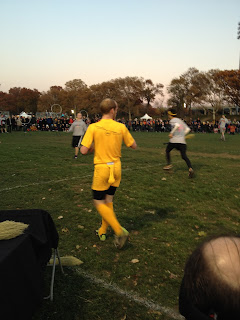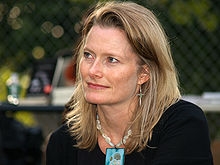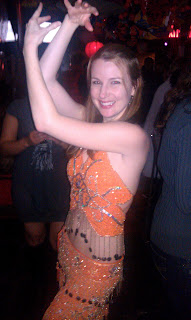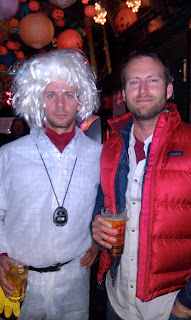My orgy of author talks is almost over - I have only one more, a reading by Jennifer Egan and Jeffrey Eugenides left - and there were some surprises along the way. I bought tickets to see Michael Ondaatje and Geraldine Brooks, and it just so happened that each was paired with another author with whom I was unfamiliar. I enjoyed both new authors immensely, and as a result have added yet more books to my ever-growing To-Read list. Ah well, there are worse fates.

I saw Michael Ondaatje and Ann Enright first. I like Ondaatje very much, though he generally makes me feel rather guilty. His books, the most famous of which is
The English Patient, are sumptuous but require just about undivided attention to really appreciate. These days, I read on the crowded subway, swaying buses, and public benches, and while I was able to relish the ravishing, symbolic imagery at the end of
Divisadero, I know I missed a lot leading up to it. Ondaatje has wild, white hair that sticks up in clumps above a neat white beard. He wore a tweed suit over a light blue shirt with no tie, and donned a pair of glasses to read from
The Cat's Table, a partially autobiographical book he has just published. (He noted that, in contrast with the main character's vivid account of a long voyage, he recalls only playing ping pong when he made the same voyage as a boy.) Ondaatje was a splendid reader, largely because of his sonorous, lightly accented voice, and the audience sat stock still as he spoke, stirring only between readings. His affect was a bit flat, however, and I had no more sense of his personality as he left the stage than I did when he walked onto it.

Ann Enright, on the other hand, who preceded Ondaatje, is someone I'd like to invite over for a cup of tea. Enright won a Man Booker Prize for
The Gathering. She wore a severe black dress, accented by a glint of gold around her neck, and though her voice was tough, she twinkled with the kind of black humor I've come to expect and enjoy from the Irish. She read two chapters from her new
Forgotten Waltz, standing on one foot at times and balancing on the heel of the other sensible black pump. During the Q & A that followed the readings, she breezily declared that a character's likability was not something that bothered her much, and I believe it. She seems quite comfortable in her own skin.

I had the thrill of seeing Geraldine Brooks, one of my all-time favorites, not once but twice. At Symphony Space, she spoke about making choices for the 2011 collection of
Best American Short Stories, of which she was this year's editor. (Each year, a different "celebrity" author is chosen to select the 20 best short stories of the year.) This was one of the best literary events I've attended. Brooks talked about the physical longing she felt as she received packets of short stories to review, stating that literature should always make you feel as though you can't wait another instant to dive in. Three actors read stories from the collection, and they were, of course, superb. I got to see her again at the 92nd Street Y two weeks later, where she focused on her own work. Brooks was introduced by a spunky foreign correspondent for NPR named Jacki Lydon. She and Brooks became friends through a series of experiences working as journalists in the kinds of countries most people pointedly avoid. Ed, having heard her on the radio for years, commented that it was nice to put a face with a voice. She is short, with a dyed, exuberant bob, and introduced Brooks in a voice brimming with drama. I found myself liking her very much. Brooks, in contrast, was soft-spoken. She said she wasn't very good at reading, that she'd rather just "blather on," and at first I didn't much care for her reading style, to be honest. But it grew on me as she went, probably in part because I was, as I always am with her work, totally sucked into the story within the first few sentences. I'm aching to start reading her latest,
Caleb's Crossing, though I'm reluctant to read my own signed copy because I want to keep it pristine, and the wait list at the library is long.

I knew little about Alan Hollinghurst, and decided not to read any of his books after learning a bit about them. The descriptions failed to grab me, somehow. Like Enright, however, I'm far more interested in him now that I've heard him read. He is tall and thin, with the kind of sophisticated accent you get from attending all the right schools and moving in all the right social circles in London. As a gay man, he writes about gay protagonists, so his work, while lauded by critics, appeals mostly to a niche market. Still, he won a Man Booker Prize for
The Line of Beauty. He read to us from
The Stranger's Child, and to my surprise I found myself swept away in the narrative. I've decided to put him on my list as well, though I'm not sure which title I'll look for first.
The Q & A afterwards was, as it almost always is, fascinating. Brooks said she imbues her work with "the heat of the past" by spending a great deal of time trying to use the kind of language people would actually have used to name and describe things, and since her books are mostly told in first person, this requires quite a bit of research, I imagine. Hollinghurst says that his secret is treating the past as if it were the present, and allowing his characters' emotions and personal dramas to be just as valid as those of people today. Brooks said she does not "entertain writer's block" and that she writes every single day, even when it feels like hefting huge stones. She is full of ideas for additional books, though - she is the type who is interested in everything - and she likened trying to choose one to being an air traffic controller at La Guardia trying to decide which of the circling planes to flag down. Hollinghurst, eyeing her a bit suspiciously, sardonically countered that for him, it is more often like scanning a starkly empty horizon.
 |
| Signed books from Ondaatje and Brooks |
The weather today is gloomy and wet. While I hate to see summer go, it's pleasant to think about a winter spent in my cozy apartment with one of the many, many books I keep adding to my to-read list, which, if I keep attending these sorts of events, I will surely never live long enough to see the end of. I am thrilled to have this problem.

 The Metropolitan Opera House is spectacular. It's covered with red velvet and lit by grand chandeliers that rise up toward the ceiling as the lights go down. It was an elegant, quietly splendid venue. The crowd, I'm sorry to say, was often less elegant. Before the show and between acts, Ed and I did a lot of dramatic head jerking and whispering to draw each other's attention to yet another relic of the 1920's dressed in a skimpy, sequined cocktail dress her granddaughter was probably too old for. We also spent several minutes in hot debate about whether that person with the long hair, sparkling headband, and utility vest was a man or a woman. To balance this out, however, there were women in luscious furs and men in richly tailored suits and tuxedos.
The Metropolitan Opera House is spectacular. It's covered with red velvet and lit by grand chandeliers that rise up toward the ceiling as the lights go down. It was an elegant, quietly splendid venue. The crowd, I'm sorry to say, was often less elegant. Before the show and between acts, Ed and I did a lot of dramatic head jerking and whispering to draw each other's attention to yet another relic of the 1920's dressed in a skimpy, sequined cocktail dress her granddaughter was probably too old for. We also spent several minutes in hot debate about whether that person with the long hair, sparkling headband, and utility vest was a man or a woman. To balance this out, however, there were women in luscious furs and men in richly tailored suits and tuxedos.







































